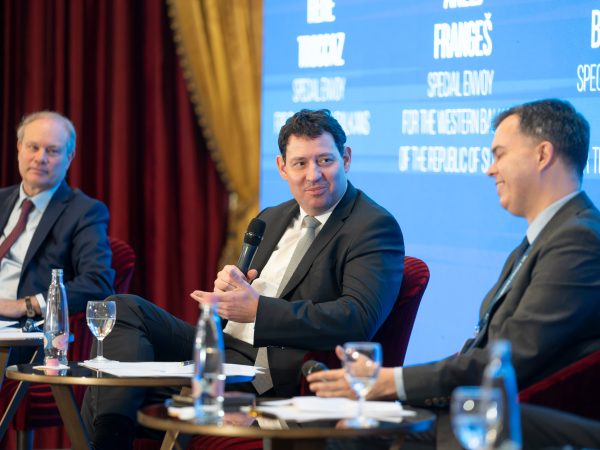The Institute of Foreign Affairs and Trade organised a roundtable discussion on the first 100 days of the Trump presidency on 11 May 2017. The invited experts were Tamás Péter Baranyi, leading researcher of the Antall József Knowledge Centre, Tamás Magyarics, associate professor of the Eötvös Loránd University, Márton Ugrósdy, deputy director for strategy and researcher of IFAT, and Gábor Zord, journalist for foreign policy of Magyar Nemzet. The discussion was moderated by Bence Németh, research fellow of IFAT.
The Institute of Foreign Affairs and Trade organised a roundtable discussion on the first 100 days of the Trump presidency on 11 May 2017. The invited experts were Tamás Péter Baranyi, leading researcher of the Antall József Knowledge Centre, Tamás Magyarics, associate professor of the Eötvös Loránd University, Márton Ugrósdy, deputy director for strategy and researcher of IFAT, and Gábor Zord, journalist for foreign policy of Magyar Nemzet. The discussion was moderated by Bence Németh, research fellow of IFAT.
In the initial phase of the discussion, the experts evaluated the current questions of the presidency covering the resignation of FBI Director James Comey, the transformation of US – Russia relations in connection with the Tillerson – Lavrov secretary of state – level meeting, and Trump’s foreign and domestic policy measures.
In the following phase of the roundtable discussion the panellists analysed some of the most important issues of global politics including the fight against the Islamic State, the political crisis of South Korea, the case of China and North Korea, and the USA’s policies towards Europe.
According to Gábor Zord, the situation in the White House is rather chaotic even after passing the fourth month mark: Trump’s strategy is questionable and the unpredictability of the presidency can be considered as a factor of uncertainty. Márton Ugrósdy noted that the fluctuation of the USA – Russia relations is not a novelty at all, it is even less surprising in a historical preview. The researcher highlighted that the interests of the USA did not change because of the election of the new president, however, policies might even shift in favour of a pragmatic approach regarding foreign policy measures. Paying attention to Donald Trump’s critiques regarding NATO, Tamás Péter Baranyi was sceptical about them since he argued that maintaining and strengthening the largest military treaty organisation is a high priority issue for the USA. In the opinion of Tamás Magyarics, the NATO serves as an indispensable bridge towards European countries and in in the meantime it guarantees the supremacy of the USA in the military and political dimensions of the relations respectively. Concerning Far Eastern relations, the researchers agreed that the issue of North Korea and the tasks related to it would be put as a high priority on the security policy agenda of the Trump administration, however, they stressed that besides the USA, the involvement of China regarding the reconciliation of the tensions that are present in the Korean Peninsula is unavoidable.



